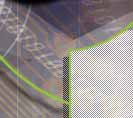
|
|||||
Workshop Toolkit
Action Toolkit

a project of Media Working Group
Workshop Toolkit
note from the filmmaker helen de michiel
 |
Forward, backward and spiraling – it takes a thousand steps or more to become an engineer, mathematician or scientist. For every new generation, it takes key movements along the way to make the leap into professional adulthood.
How do some women do it? What are their college years in-training like? And how does gender cross with our cultural assumptions of success and failure in the high-stakes professions of science, technology, engineering and math (STEM)?
When I began working with a group of young women at Ohio State University in 1997, I had so many questions about how they would navigate through their STEM training. It was the late 90s, and everything seemed possible as new technological vistas opened up daily. The high-tech bubble had begun to inflate, young college grads flocked to IT jobs, the number of families to own a home computer skyrocketed, and there was increasing discussion about the digital divide. Where were women’s voices going to develop in this new burst of the digital age?
Though women comprise the majority of undergraduates in America, only 20% are earning degrees in engineering and computer science. Opportunities for workers in STEM fields are expected to increase by 5.6 million by 2008, yet only 11% of the science and engineering workforce is comprised of women. Representing 50% of the available talent pool, women need to be both centrally involved in shaping new areas of research and technology, as well as advocating for change around the balancing of workplace and family issues.
When the Wexner Center for the Arts at Ohio State invited me to create a documentary following students who would graduate in 2001 as the first class of the new century, I was eager to organize a group from the technological and scientific fields. We created the Gender Chip Project, and a four-year long conversation was born. Our group of undergraduate women came together consistently over their college years to capture the experiences of STEM education for young women as they transition and grow into young adulthood.
The film has become a catalyst to expand the dialogue around these issues. In collaboration with Media Working Group, we are building a multimedia package of tools and resources that aims to encourage girls and young women to pursue careers in the STEM fields, and to provide training and support to the adults who mentor them. Through screenings and broadcasts, and workshops and training sessions led by Active Voice, we hope that the stories of the five students in Ohio will trigger conversation and awareness in schools, companies, organizations and colleges around the country — and that they will inspire action for improving the STEM landscape for future generations of women coming up.
